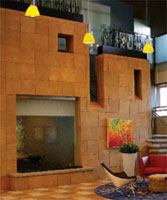ACE IN THE HOLE
ACC, however, has one more trick up its sleeve. While the firm is an operational master—We labor under a concept of better, faster, smarter,—Dowell says—the REIT is also focusing on its so-called —ace in the hole,—the American Campus Equity, or ACE, program. The ACE program is intended to allow ACC to develop student housing on-campus with its own equity without having to use third-party sources or draw on the university’s debt capacity.
According to Bayless, ACE was formed in response to an RFP issued by Arizona State University in 2005. The University wanted a financing structure that was not only —off-balance sheet— but also —off-credit—. With the traditional off-balance sheet structures having negative credit implications, using ACC equity transaction was the only suitable answer, Bayless says.
But why take this program company-wide? Today, 70 percent of students live off-campus—not always by choice—according to the Washington, D.C.-based National Multi Housing Council. Many institutions don’t have the financial capacity to address their housing needs while funding new academic and research projects. Even those universities that structure off-balance sheet student housing developments often find that ratings agencies still consider the school to be responsible for the debt. That leaves many schools facing a catch-22. They need to boost their student housing offerings to stay competitive and attract students, but they don’t have any way to pay for it. That’s where ACC steps in.
ACC did its first ACE deal with Arizona State University in 2005. The project—the 1,866-bed Vista del Sol—is located on the ASU campus in Tempe, Ariz. ACC did a ground-up lease for the project and developed the facility on its own dime. Though it won’t open for the 2008-2009 academic year until this fall, Vista del Sol was 116 percent applied for and 100 percent pre-leased by March 31.
—ACC has allowed us to move much faster in fulfilling a critical need than we would have been able to otherwise,—says Carol Campbell, executive vice president and CFO for ASU.—They’ve been problem solvers with us, and we have found them incredibly flexible and creative. If we had to rely on our own debt capacity, it would have taken us a lot longer.—
In addition to Vista del Sol, ACC has another ACE project under development on ASU’s Tempe campus—the Barrett Honors College, a $126.5 million, 1,720-bed community. The facility not only provides housing for honors students, but it will also house the dean’s office, study space, and classrooms.—ACC understands the educational mission and places value on that,—says Michael Coakley, associate vice president and executive director of university housing for ASU. —They truly have some of the best people I’ve ever worked with, and they understand this collaborative approach.—
